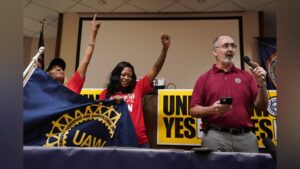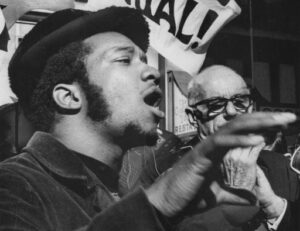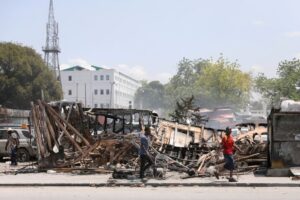In this article, originally published in the Uruguayan newspaper Brecha, and republished in Correspondencia de Prensa, the Uruguayan socialist journalist Raúl Zibechi argues that Bolsonaro’s strong second-place finish in the recent Brazilian presidential election showed that the far right is deeply rooted in Brazilian society, even if it may not defeat Lula in the October 30 presidential runoff. The ISP translated this text to English.
The 43 percent of the electorate that President Jair Bolsonaro won on October 2 doesn’t lend itself to simplistic explanations. After four years of anti-democratic outrages, of flirting with the memory of the 1964 military coup, of threatening the courts, the parliament, the opposition parties and of having mismanaged the pandemic—costing the lives of more than 700,000 Brazilians—the vote is a slap in the face of all those who oppose the ultra-right.
To understand what happened—why Bolsonarismo has such a strong foothold in society—we must set aside the left’s traditional excuses that blame defeats on the role of the mass media. During this election, many of the major media (for example, Rede Globo and Folha de São Paulo) sided against Bolsonaro, although Bolsonaro had a major ally in the powerful evangelical media.
“All over the Brazilian map what was seen was the furious growth or confirmation of a broad and apparently solid base that oscillates between the right and the ultra-right,” Brazilian journalist Eric Nepomuceno pointed out. Should Lula da Silva win in the second round, the PT leader will have to govern against the tide, since the majority of the Congress and most state governors are Bolsonaro supporters.
Ideology and economics
In a recent publication by the University of Vale do Rio dos Sinos, Róber Iturriet Avila, economist and professor at the Department of Economics and International Relations of the Federal University of Rio Grande do Sul, argues that “the extreme right is rooted and much stronger than previously thought. It has an unprecedented size in Brazilian history, driven by businessmen, agribusiness and international organizations.”
To Iturriet Avila, the Bolsonaristas of today “are the same types who opposed [populist presidents] Getúlio Vargas and Juscelino Kubitschek in the 1950s and João Goulart in the 1960s.” They are strong enough to stop progressive reforms while “continuing to threaten democratic institutions, even if Lula wins the second round”. Iturriet Avila focuses on the extreme right that wants to dismantle the democratic institutions of 1985 [when military rule ended] and the 1988 Constitution, which resulted in the expansion of social rights and public services.
This type of analysis emphasizes conservative ideologies and values, as well as the anti-rationalism that the extreme right advocates. But Iturriet Avila goes on to acknowledge that “the primary sector [i.e. agribusiness and extractive industry] has made gains with the Bolsonaro government and there has been an increase in income transfer policies” to the popular sectors, although the urban middle classes lost purchasing power and access to deteriorating services such as education. In the last two months, the economy has improved, and the government announced a tax cut that cut the cost of fuel by 40 percent.
Indeed, Bolsonaro’s rhetoric against communism and the Workers’ Party, conservative values such as “God, country and family” and the rejection of an alleged gender ideology would not be enough to get 50 million votes. On the other hand, Bolsonaro’s anti-corruption banner turned out to be a façade, as far-right voters turned a blind eye to government corruption. Indeed, they overlooked scandals rocking the Bolsonaro clan, from the questionable purchase of real estate to the collusion of one of his sons with the murderers of [socialist legislator] Marielle Franco, among others.
What did work for Bolsonarismo was polarization, which has been driven from the Planalto Palace [the equivalent of the White House] since 2018. All analyses hold that the election deepened political polarization. So-called “third way” options lost and former two-term President Fernando Henrique Cardoso’s PSDB (Brazilian Social Democracy Party) has practically disappeared.
Inequality and hatred of the poor
The markets greeted the first-round results with an increase of almost 5 percent in the São Paulo Stock Exchange and a 4 point drop in the local dollar exchange rate. Both figures are the highest in these areas in a long time and, according to O Globo columnist Miriam Leitão, big business is celebrating “that Lula will be forced to walk towards the center.” For big capital, Lula’s growing moderation by selecting Geraldo Alckmin, a defender of neo-liberalism, as his running mate is not enough.
It’s clear that a considerable part of Brazilian society rejects the left, which it considers the only corrupt force, while it adores the military and the scandal-plagued Military Police. But there is also a growing hatred of the poor, particularly of the Black and favela population. “Since Governor Cláudio Castro defended police violence in the favelas, he has gotten more popular in the polls,” reflects geographer and professor at the Federal Fluminense University Timo Bartholl.
Law professor Ricardo Evandro Santos Martins assures that “what scandalizes the Bolsonaristas, beyond their Christofascist moralizing, is the decrease in social inequality, the horror at the presence of the poorer classes in spaces that used to belong only to the privileged (from airports to universities). It is a true rejection of the poor, a phobia”.
Rio, mirror of Brazil
The need to maintain social and economic distinction, associated with racial apartheid, seems to go hand in hand with the defense at all costs of the violence of repressive apparatuses, such as the Military Police. The results in Rio de Janeiro, one of the most violent cities in the continent, are related to this racial and class segregation. Almost 60 percent of the votes for governor went to Castro, an ally of Bolsonaro and heir of Governor Wilson Witzel, fired over corruption charges on the first anniversary of his administration.
It is possible that the state of Rio and the city itself are a mirror of the new Brazil that has been simmering since the end of the military dictatorship. Sociologist José Cláudio Alves, dedicated to the study of vigilante groups, argues that today’s Rio militias are heirs of the death squads. “Five decades of extermination groups resulted in 70 percent of votes in favor of Bolsonaro in the Baixada Fluminense,” he says.
The Baixada is the huge periphery of Rio populated by 4 million people, living in dormitory towns, with serious housing, sanitation, education and health problems. The militias already control at least 57 percent of Rio’s territory, which is equivalent to having almost 6 million people at the mercy of paramilitary organizations, according to researchers at the Fluminense Federal University and the Federal University of Rio de Janeiro.
For this reason, Alves argues that “in Rio de Janeiro the militia is not a parallel power. It is the state.”“The assassin is elected, the militia member is elected. He has direct relations with the state. He is the agent of the state. He is the state. So don’t tell me there is an absence of the state. It is the state that determines who will operate militarized control and security in that area.” In short, the militia member can be a congressman, a mayor, or the Secretary of the Environment.
This militia or paramilitary state—similar, perhaps, to the one managed and propped up by Álvaro Uribe in Colombia—seems to be the model that the Bolsonaristas are expanding around the country as a way of maintaining elite privilege, with the support of broad sectors of the business community and the armed forces.
The sociologist José de Souza Martins offers a good synthesis. He argues that Brazil has ceased to be an emerging capitalist country and is returning to the role of subaltern and dependent: “A partisan but not politicized country, Brazil is historically and politically a country with a right-wing tendency, where the left has always been a minority”. He concludes: “Here it is not right or left as in Europe, but between more right and less right”.
Raúl Zibechi (born January 25, 1952 in Montevideo, Uruguay) is a radio and print journalist, writer, militant and political theorist.




